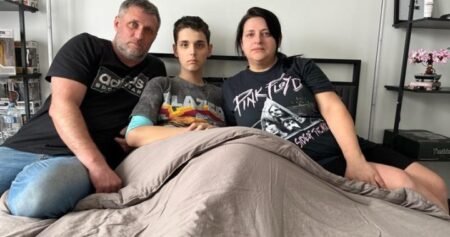There are more kids in need of a safe, supportive home than there are foster care parents able to provide that roof over their head, according to an Edmonton agency that facilitates finding homes for children in care.
“We have these vulnerable little people where their family members might be going through a crisis and they don’t have the support necessary,” said foster mom Carrie, who has been welcoming kids into her home for two decades.
Global News is not disclosing Carrie’s last name for privacy and safety reasons.
“My heart breaks to know there’s thousands of kids out there that just need that person, that person temporarily to be a safe place, to be safe home, to be able to be that support.
“We are lucky if you have one person in your life that can be there for you and some of these kids have nobody.”
McMan Foster Care said it is urgently seeking new foster parents in Edmonton and surrounding areas as soon as possible.
“Becoming a foster parent is an incredibly rewarding experience,” said Corie Entrop, the program manager for McMan Foster Care’s north region.
“We know it’s a hard job. Sometimes it’s a thankless job, but we need we need people who want to give back and can provide care for kiddos that need it.”
Children in care have often experienced trauma and need a caring adult to guide them, Entrop said, adding McMan provides ongoing support to caregivers who want to become foster parents.
“McMan Foster Care is with them every step of the way, so they are never alone when becoming a foster parent,” Entrop said.
McMan has been given a new contract with the Alberta government to support 75 more children in care in the region and needs parents to help fulfil the need — and that’s just with McMan, which is one of several agencies that works with Children and Family Services to find homes for kids in care.
“We do know that across the province, there’s a foster care crisis and there’s thousands of children that need safe places to be,” Entrop said.
“It’s big worry because they’re having to be quite creative maybe on how they’re placing children, making sure they have a safe place to be. Maybe some families are taking a kid or two extra, but that creates stress on everybody, right? So there’s just that definite need to have people reach out.”
For more than three decades, the organization has been providing foster care services in the Edmonton area (the city, plus surrounding communities like Spruce Grove, Stony Plain, Leduc, Sherwood Park, etc.) and northern Alberta areas like Bonnyville, Fort McMurray, Grande Prairie, and Whitecourt.

Get breaking National news
For news impacting Canada and around the world, sign up for breaking news alerts delivered directly to you when they happen.
When there are not enough foster homes in an area, children in care are forced to move out of their communities — losing their friends, schools, and family connections when they must move.
McMan Foster Care said its goal is to keep children close to their biological families and in their schools.
“That’s not ideal because they’re already losing their home,” Entrop said. “Sometimes schools, especially, are the safe place for kids, so we really want to keep kids in their communities.
“If we can grow the number of families that we have in this area, kids can stay in their own communities and then they’re closer to visit with their families as well.”
Carrie said some of her kids are from out of province in Saskatchewan and Manitoba, and it’s a lot of work making sure they get home to visit with extended family – highlighting the need for more foster families in more communities.
“We need that bridge. We need that person that is close to home so that those kids can work towards getting back to their families.”
Carrie said being a foster parent becomes an all-encompassing lifestyle.
“I’m foster anything you want me to be for the last 19 years,” Carrie said with a smile.
“To some I’m ‘mum,’ to some I’m ‘auntie,’ I am ‘meemaw’, and to some of them, I’m ‘bro.’”
Some children stay in their foster home temporarily — but for others, they find a new family.
“In my home, we have five that we have adopted. We have one that is currently in care still, one that has aged out but still lives with us, one that we’ve transitioned home, and then I have taken on a few adults that needed a place to be,” she said, adding all those people still have relationships and connections with their biological families.
“Sometimes you can’t go home, but that doesn’t mean that the relationship for that child needs to end there.”
McMan Foster Care said it’s looking in particular for Indigenous families and allies for children and youth from the LGBTQ2 community.
To become a foster parent, you must be at least 21 years old and a resident of Alberta.
Foster homes should be safe, stable, caring environments, so other eligibility requirements include foster parents being financially stable, free from major illnesses, have no major trauma in the past year such as a death in the family or divorce.
Couples looking to be foster parents don’t need to be legally married or own their own house, but if living together must have been in a stable relationship for the past 12 months and be able to provide their foster child with their own bedroom. Singles can also foster, as long as they have an appropriate support network.
In order to give their foster kids the attention they need, foster parents should also have no children under the age of one currently living in the home or be expecting a baby — but also have direct experience related to child care. Families are compensated for taking on the responsibility, Entrop said.
“They are given money to help maintain the child’s expenses, as well as a skill fee every day for the child, when the child is in their home. But with the cost of living and with everything going up, you’re not going to become rich for fostering,” Entrop said.
Carrie echoed that sentiment, adding for her it’s a fulfilling lifestyle.
“There is definitely help in being able to add to the grocery list — my grocery list is huge because I have 11 people in my home. So it is helpful to be able to have that extra funds to be able to make sure I have jugs of milk in the house,” she said.
That said, Carrie noted in an ideal situation, foster care would be temporary.
“If the system was working better, I wouldn’t be needed. That’s the bottom line. We would have kids that would be reunited with their families. We would kids back in their community. We would the support network that was needed so these kids wouldn’t have to come to my house.”
Entrop noted foster parents are given the final say on which children are entering their home, in order for everyone to be happy with the living arrangement.
“Foster families aren’t pressured to take an age that they don’t want or something like that — so sometimes there might be a 15-year-old that needs a placement, but we only have beds for littler ones, let’s say.”
There are other requirements, and the entire process from start to finish should take five to six months. Carrie said it’s a lifetime of growth for all involved.
“You learn with your kids. You learn different views in the world, and you start to grow as a person as you’re growing your kids.”
She said she’s personally taken on the work of helping her foster kids find and build connections with their extended families.
“There is a sense of reward when you can connect a family member to a lost child. And so I’m hoping that other people will think about potentially opening up their homes and being that bridge to be able to help.”
Read the full article here
















